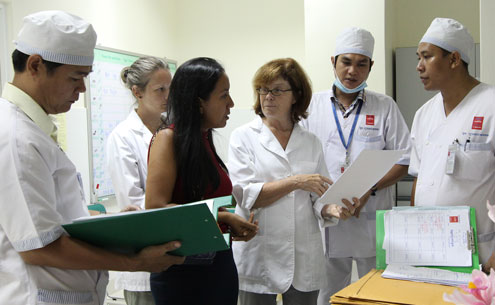Sharing Knowledge and Saving Lives

Betsy Chafcouloff, third from right, at Calmette Hospital in Phnom Penh, Cambodia, trains local health care professionals to treat people afflicted with speech, language and swallowing disorders. Photo by Alexis Bustos.
In 2008, as her two-week vacation in Cambodia drew to a close, Betsy Chafcouloff(M.A., ’90; M.S., ’02) sensed she’d have trouble saying goodbye to a country she had quickly fallen in love with.
“I thought, well, I’m going to retire in five years, and I really want to come back here and volunteer.”
True to her word, Chafcouloff began looking into volunteer opportunities for someone with her background and training in speech pathology. The longtime San Franciscan has a special interest in swallowing disorders that afflict adults as a result of stroke, Parkinson’s disease, brain injury and other neurological conditions.
What Chafcouloff found — or, rather, didn’t find — came as a shock.
In the United States and many other parts of the world, speech pathologists are able to treat adults who suffer from neurogenic speech, language and swallowing problems. But Cambodia, which is one of the poorest countries in Asia, had no training programs in this branch of medical science.
That meant that large numbers of Cambodian adults had nowhere to go for competent speech-pathology care. For those with swallowing difficulties, the consequences were dire. “People with swallowing problems eat, but not very well, so they lose weight or they get pneumonia or get dehydrated and malnourished,” Chafcouloff says. “Sometimes it’s very gradual but sometimes it’s very severe, and people die.”
In 2013, Chafcouloff stepped in to fill the void. Newly retired after a long career, first teaching English as a second language and later working as a speech pathologist in care facilities, Chafcouloff formed a 501(c)(3) nonprofit called Speech Therapy Cambodia. The organization trains Cambodian health care professionals to evaluate and treat people with speech, language and swallowing problems acquired as adults.
Thanks to the nonprofit, about a dozen Cambodian neurologists and physical therapists, working out of two public hospitals in Phnom Penh, are now able to help patients relearn functions that most of us take for granted, such as expressing a simple thought or swallowing a bite of food.
So far, Speech Therapy Cambodia has helped about 200 people. Some live in the impoverished countryside and travel to the capital on the backs of motorized rickshaws called tuk-tuks.
When a stroke left an 85-year-old survivor unable to swallow, doctors said there was nothing to be done and sent the frail octogenarian home to die. Chafcouloff knew better. She prescribed exercises to improve oral muscle movement and better feeding techniques. “He is still with us, two years later,” Chafcouloff says.
That the nascent nonprofit is already making a difference comes as little surprise to those who know Chafcouloff.
Speech Therapy Cambodia “is a brilliant thing for her to be doing because she has the perfect background,” says Pat Porter, professor emerita of English and longtime friend. “She’s a superstar.”